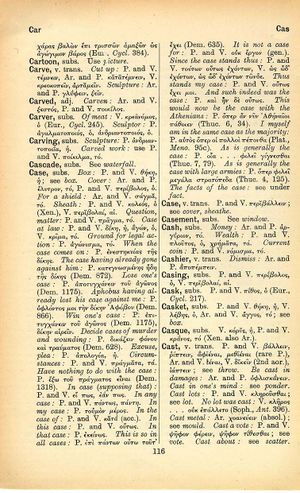case: Difference between revisions
Μοχθεῖν ἀνάγκη τοὺς θέλοντας εὐτυχεῖν → Laboret is, beatam qui vitam cupit → Sich abarbeiten muss, wer glücklich leben will
(Woodhouse 2) |
(CSV3) |
||
| Line 1: | Line 1: | ||
{{ | {{Woodhouse1 | ||
| | |Text=[[File:woodhouse_116.jpg|thumb|link={{filepath:woodhouse_116.jpg}}]]'''subs.''' | ||
<b class="b2">Box</b>: P. and V. [[θήκη]], ἡ; see [[box]]. | |||
<b class="b2">Cover</b>: Ar. and P. [[ἔλυτρον]], τό, P. and V. [[περίβολος]], ὁ. | |||
<b class="b2">For a shield</b>: Ar. and V. [[σάγμα]], τό. | |||
<b class="b2">Sheath</b>: P. and V. [[κολεός]], ὁ (Xen.), V. περιβολαί, αἱ. | |||
<b class="b2">Question, matter</b>: P. and V. [[πρᾶγμα]], τό. | |||
<b class="b2">Case at law</b>: P. and V. [[δίκη]], ἡ, [[ἀγών]], ὁ, V. κρῖμα, τό. | |||
<b class="b2">Ground for legal action</b>: P. [[ἀγώνισμα]], τό. | |||
<b class="b2">When the case comes on</b>: P. ἐνεστηκυίας τῆς δίκης. | |||
<b class="b2">The case having already gone against him</b>: P. κατεγνωσμένης ἤδη τῆς δίκης (Dem. 872). | |||
<b class="b2">Lose one's case</b>: P. ἀποτυγχάνειν τοῦ ἀγῶνος (Dem. 1175). | |||
<b class="b2">Aphobus having already lost his case against me</b>: P. ὀφλόντος μοι τὴν δίκην Ἀφόβου (Dem. 866). | |||
<b class="b2">Win one's case</b>: P. ἐπιτυγχάνειν τοῦ ἀγῶνος (Dem. 1175), δίκην αἱρεῖν. | |||
<b class="b2">Decide cases of murder and wounding</b>: P. δικάζειν φόνου καὶ τραύματος (Dem. 628). | |||
<b class="b2">Excuse, plea</b>: P. [[ἀπολογία]], ἡ. | |||
<b class="b2">Circumstances</b>: P. and V. πράγματα, τά. | |||
<b class="b2">Have nothing to do with the case</b>: P. [[ἔξω]] τοῦ πράγματος εἶναι (Dem. 1318). | |||
<b class="b2">In case</b> (<b class="b2">supposing that</b>): P. and V. εἴ πως, ἐάν πως. | |||
<b class="b2">In any case</b>: P. and V. [[πάντως]], πάντη. | |||
<b class="b2">In my case</b>: P. τοὐμὸν [[μέρος]]. | |||
<b class="b2">In the caise of</b>: P. and V. [[κατά]] (acc.). | |||
<b class="b2">In this case</b>: P. and V. [[οὕτως]]. | |||
<b class="b2">In that case</b>: P. ἐκείνως. | |||
<b class="b2">This is so in all cases</b>: P. ἐπὶ πάντων οὕτω τοῦτʼ ἔχει (Dem. 635). | |||
<b class="b2">It is not a case for</b>: P. and V. οὐκ [[ἔργον]] (gen.). | |||
<b class="b2">Since the case stands thus</b>: P. and V. τούτων [[οὕτως]] ἐχόντων, V. ὡς ὧδʼ ἐχόντων, ὡς ὧδʼ ἐχόντων τῶνδε. | |||
<b class="b2">Thus stands my case</b>: P. and V. [[οὕτως]] ἔχει μοι. | |||
<b class="b2">And such indeed was the case</b>: P. καὶ ἦν δὲ [[οὕτως]]. | |||
<b class="b2">This would now be the case with the Athenians</b>: P. [[ὅπερ]] ἄν νῦν Ἀθηναῖοι πάθοιεν (Thuc. 6, 34). | |||
<b class="b2">I myself am in the same case as the majority</b>: P. αὐτὸς [[ὅπερ]] οἱ πολλοὶ [[πέπονθα]] (Plat., <b class="b2">Meno.</b> 95C). | |||
<b class="b2">As is generally the case</b>: P. οἷα . . . φιλεῖ [[γίγνομαι|γίγνεσθαι]] (Thuc. 7, 79). | |||
<b class="b2">As is generally the case with large armies</b>: P. [[ὅπερ]] φιλεῖ μεγάλα στρατόπεδα (Thuc. 4, 125). | |||
<b class="b2">The facts of the case</b>: see under [[fact]]. | |||
'''v. trans.''' | |||
P. and V. περιβάλλειν; see [[cover]], [[sheathe]]. | |||
}} | }} | ||
Revision as of 09:24, 21 July 2017
English > Greek (Woodhouse)
subs.
Box: P. and V. θήκη, ἡ; see box.
Cover: Ar. and P. ἔλυτρον, τό, P. and V. περίβολος, ὁ.
For a shield: Ar. and V. σάγμα, τό.
Sheath: P. and V. κολεός, ὁ (Xen.), V. περιβολαί, αἱ.
Question, matter: P. and V. πρᾶγμα, τό.
Case at law: P. and V. δίκη, ἡ, ἀγών, ὁ, V. κρῖμα, τό.
Ground for legal action: P. ἀγώνισμα, τό.
When the case comes on: P. ἐνεστηκυίας τῆς δίκης.
The case having already gone against him: P. κατεγνωσμένης ἤδη τῆς δίκης (Dem. 872).
Lose one's case: P. ἀποτυγχάνειν τοῦ ἀγῶνος (Dem. 1175).
Aphobus having already lost his case against me: P. ὀφλόντος μοι τὴν δίκην Ἀφόβου (Dem. 866).
Win one's case: P. ἐπιτυγχάνειν τοῦ ἀγῶνος (Dem. 1175), δίκην αἱρεῖν.
Decide cases of murder and wounding: P. δικάζειν φόνου καὶ τραύματος (Dem. 628).
Excuse, plea: P. ἀπολογία, ἡ.
Circumstances: P. and V. πράγματα, τά.
Have nothing to do with the case: P. ἔξω τοῦ πράγματος εἶναι (Dem. 1318).
In case (supposing that): P. and V. εἴ πως, ἐάν πως.
In any case: P. and V. πάντως, πάντη.
In my case: P. τοὐμὸν μέρος.
In the caise of: P. and V. κατά (acc.).
In this case: P. and V. οὕτως.
In that case: P. ἐκείνως.
This is so in all cases: P. ἐπὶ πάντων οὕτω τοῦτʼ ἔχει (Dem. 635).
It is not a case for: P. and V. οὐκ ἔργον (gen.).
Since the case stands thus: P. and V. τούτων οὕτως ἐχόντων, V. ὡς ὧδʼ ἐχόντων, ὡς ὧδʼ ἐχόντων τῶνδε.
Thus stands my case: P. and V. οὕτως ἔχει μοι.
And such indeed was the case: P. καὶ ἦν δὲ οὕτως.
This would now be the case with the Athenians: P. ὅπερ ἄν νῦν Ἀθηναῖοι πάθοιεν (Thuc. 6, 34).
I myself am in the same case as the majority: P. αὐτὸς ὅπερ οἱ πολλοὶ πέπονθα (Plat., Meno. 95C).
As is generally the case: P. οἷα . . . φιλεῖ γίγνεσθαι (Thuc. 7, 79).
As is generally the case with large armies: P. ὅπερ φιλεῖ μεγάλα στρατόπεδα (Thuc. 4, 125).
The facts of the case: see under fact.
v. trans.

